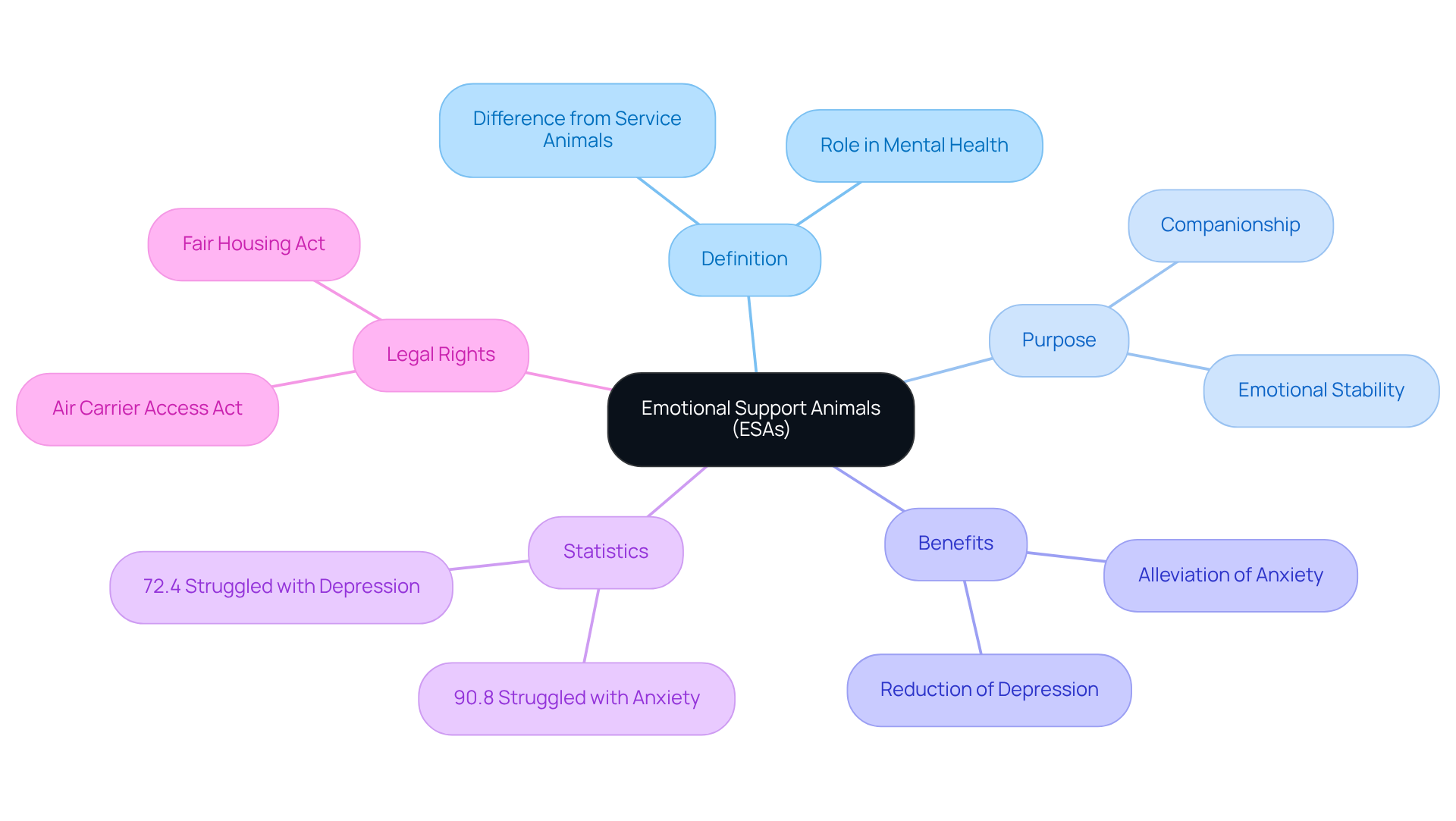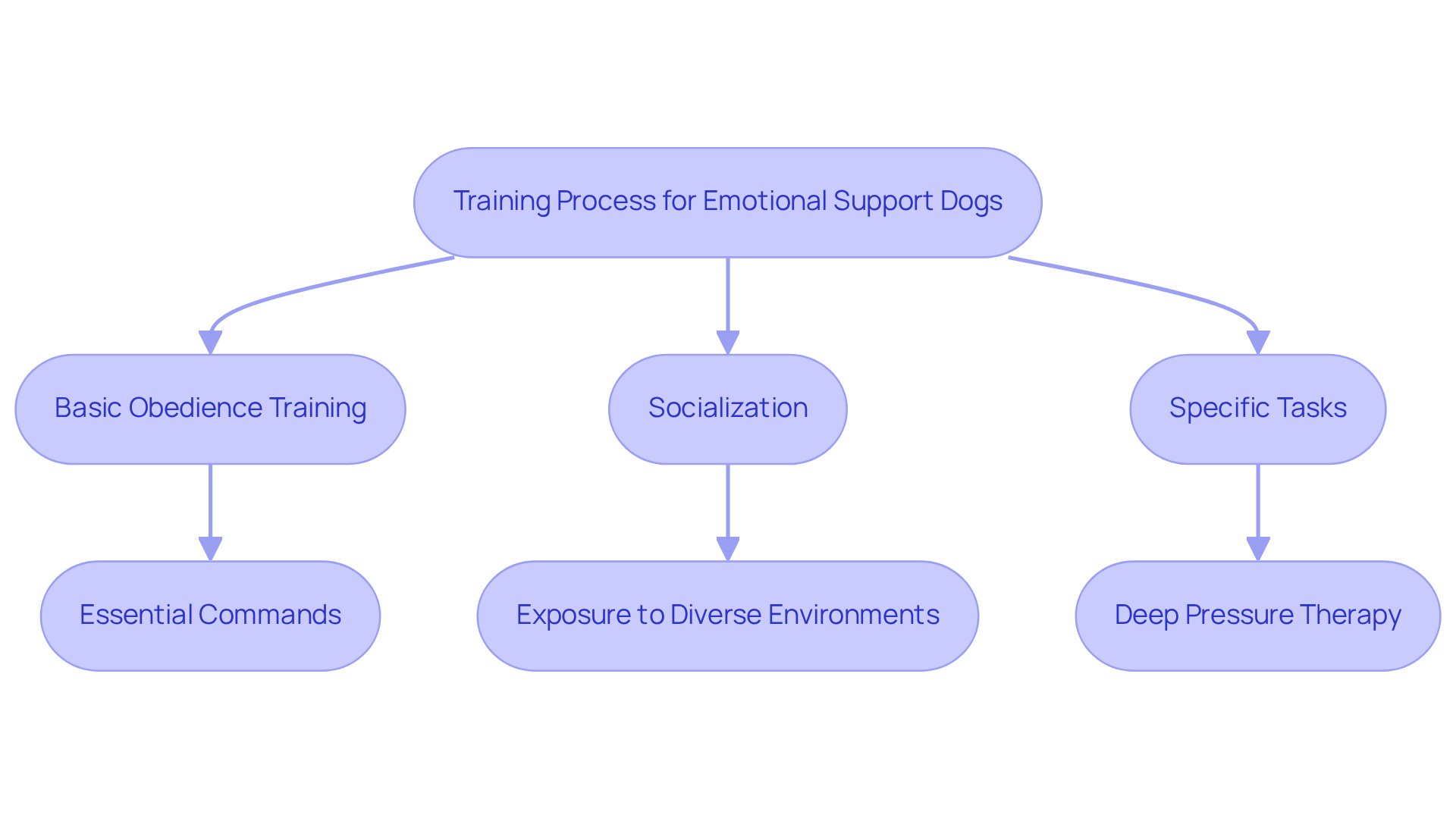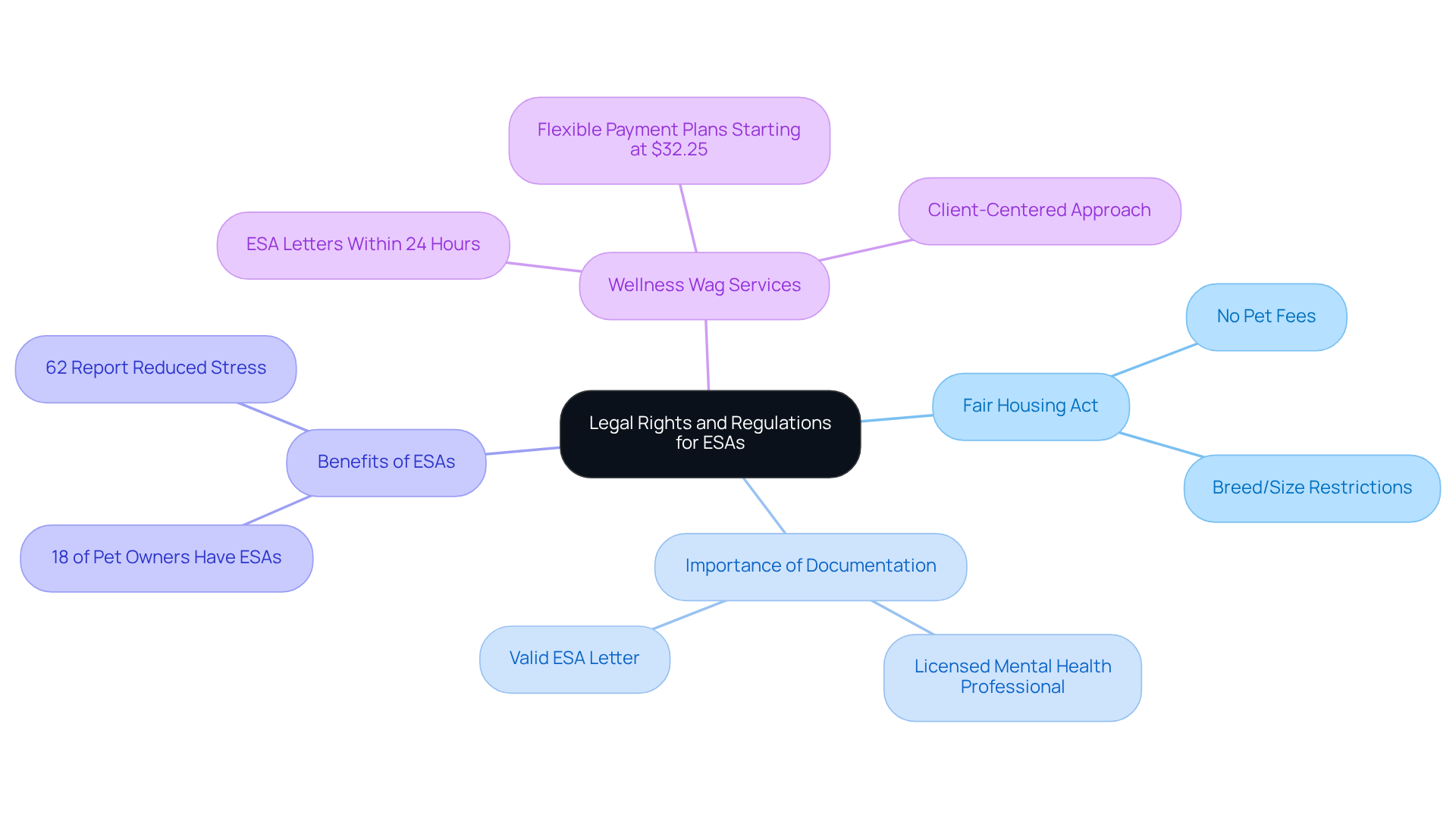

esa support dog: Understanding Benefits, Training, and Legal Rights
by Lena Park
Last updated: July 1, 2025
Verified and Approved by:
Angela Morris,
MSW, LCSW
Fact Checked

Overview
Emotional support animals (ESAs), especially ESA support dogs, offer vital companionship and emotional stability to those grappling with mental health challenges. They significantly alleviate symptoms of anxiety and depression, providing a sense of comfort and security.
It’s heartening to note that:
- 84% of ESA owners report noticeable improvements in their mental health.
- This statistic underscores the therapeutic role these animals play in our lives.
Moreover, ESAs possess important legal rights under the Fair Housing Act, allowing them to reside with their owners in pet-restricted housing, which can be a significant relief for many.
If you or someone you know is facing these challenges, consider the support that an ESA can bring into your life.
Introduction
The growing recognition of emotional support animals (ESAs) underscores their essential role in enhancing mental health and well-being. These beloved companions offer not only comfort but also a profound sense of security for individuals navigating the complexities of anxiety, depression, and other emotional challenges. As the benefits of having an ESA become increasingly clear, it prompts important questions about their training, legal rights, and the significant impact they can have on living situations.
How might understanding these elements empower individuals to fully embrace their relationship with these extraordinary animals?
Define Emotional Support Animals and Their Purpose
An esa support dog serves as a cherished companion, offering vital comfort and assistance to individuals navigating the complexities of mental health challenges. These animals differ from service animals, which are specifically trained to perform tasks for people with disabilities; instead, ESAs primarily focus on companionship and emotional stability. Their mere presence has been shown to alleviate symptoms of anxiety, depression, and other emotional hurdles. In fact, research indicates that 90.8% of individuals seeking ESA letters reported struggles with anxiety, while 72.4% faced depression. The calming effect of an ESA fosters a supportive environment, empowering individuals to manage their mental health more effectively.
Wellness Wag understands the importance of timely support and offers a streamlined process for obtaining ESA letters through personalized consultations with licensed medical professionals. Customers can expect to receive their ESA letters within 24 hours of approval, accompanied by a confirmation email detailing their purchase. With flexible payment plans starting as low as $32.25, these services are designed to be accessible to a wider audience. While an esa support dog does not require specialized training, it must be well-behaved and capable of providing comfort to its owner. This distinction underscores the therapeutic role of esa support dogs as emotional support animals in enhancing emotional well-being without the formal task training associated with service animals.
Furthermore, it is essential to understand the legal rights associated with esa support dogs and other emotional support animals under the Fair Housing Act. This knowledge empowers individuals to live with their pets in housing that may have pet restrictions, highlighting the significance of esa support dogs in today’s mental health landscape. How might having an ESA change your living situation or emotional well-being? Remember, you are not alone in this journey, and there is support available to help you thrive.

Explore the Mental Health Benefits of ESAs
The mental health benefits of an ESA support dog are profoundly supported by research, shedding light on the emotional struggles many individuals face. Numerous studies indicate that the presence of an ESA support dog can lead to significant reductions in anxiety and depression. Have you ever felt the comforting touch of a furry friend? Petting an animal has been shown to trigger the release of oxytocin, a hormone linked to bonding and stress relief, enhancing feelings of well-being. Furthermore, ESA support dogs play a crucial role in alleviating feelings of isolation, providing companionship that fosters social interaction and connection.
Consider how emotional support animals promote physical activity, which is essential for maintaining overall mental health. The unconditional love and support offered by ESA support dogs can enhance self-esteem and foster a sense of purpose, making them invaluable companions for those navigating mental health challenges. Statistics reveal that:
- 84% of ESA owners report noticeable improvements in their mental health.
- 62% indicate significant reductions in stress and anxiety levels.
- 96.80% of participants reported reduced stress and improved sleeping patterns due to their ESA support dog.
- 99.29% reported increased feelings of security.
This emphasizes the profound effect that emotional support animals have on improving emotional well-being.
As Saul Levin, M.D., CEO of the American Psychiatric Association, wisely stated, “The benefits of pet ownership to many Americans seem to outweigh the stressors.” This highlights the supportive role that an ESA support dog can play in our lives, offering not just companionship but also a pathway to healing.

Detail the Training Process for Emotional Support Dogs
While Emotional Support Dogs may not be required to undergo specialized training, it is strongly encouraged to provide them with basic obedience training. Essential commands like ‘sit,’ ‘stay,’ and ‘come’ are vital for ensuring that these loving companions behave appropriately in various situations. Socialization plays a crucial role in this journey; exposing your dog to diverse environments, people, and other animals can significantly enhance their adaptability and comfort in different settings. For instance, a well-socialized ESA is more likely to remain calm in public spaces, which is so important for their effectiveness as emotional support companions.
Some owners find joy in teaching their emotional support animals specific tasks that provide comfort, such as deep pressure therapy, where the dog gently applies pressure to help alleviate anxiety during episodes. This practice not only strengthens the bond between the dog and owner but also enhances the dog’s role as a supportive presence in times of need.
Statistics suggest that dogs trained in basic obedience are more likely to thrive in their roles as ESA support dogs. They can respond appropriately to commands and navigate various social situations with ease. The ultimate goal is to cultivate a well-behaved companion who is capable of delivering emotional support effectively, thereby maximizing the therapeutic benefits of the beautiful human-animal bond.

Understand Legal Rights and Regulations for ESAs
An esa support dog is not just a pet; it is a vital companion for individuals facing emotional challenges. Many people struggle with mental health issues, feeling isolated and overwhelmed. The good news is that specific laws protect ESA owners, granting them essential rights that can ease their burdens. Under the Fair Housing Act, individuals with a valid ESA letter are allowed to live with their beloved pets in residences that typically prohibit them. This legislation ensures that landlords cannot impose pet fees or restrictions based on breed or size, providing a sense of relief and security for owners of ESA support dogs.
While it’s important to note that emotional support animals do not have the same access rights as service animals in public spaces, some state laws may permit them in designated public areas. To effectively exercise their rights, it is crucial for ESA owners to possess proper documentation from a licensed mental health professional, validating their need for an esa support dog. This documentation not only supports their case under the Fair Housing Act but also enhances their ability to navigate housing situations where pets are generally restricted.
Did you know that around 18% of pet owners in the U.S. have ESAs? Understanding these regulations is vital for ensuring that individuals can benefit from the emotional support that esa support dogs provide while complying with legal requirements. Furthermore, studies reveal that 62% of owners of an ESA support dog report significant reductions in stress and anxiety levels, highlighting the profound emotional benefits of having an ESA support dog.
Wellness Wag, a compassionate service that has helped over 50,000 patients, provides ESA letters within 24 hours of approval, ensuring timely support for those in need. Their client-centered approach includes personalized consultations to streamline the process of obtaining ESA letters, along with flexible payment plans starting as low as $32.25, making their services accessible to a broader audience. This empowers individuals through the transformative companionship of their emotional support animals, reminding us that no one has to face their struggles alone.

Conclusion
Emotional Support Animals (ESAs) play a vital role in enhancing mental health and emotional well-being, particularly for those grappling with challenges like anxiety and depression. These animals, unlike service animals trained for specific tasks, primarily offer companionship and comfort, creating a sense of security and emotional support. The unique bond between humans and their ESA support dogs can significantly alleviate symptoms of mental health issues, making them invaluable companions in our fast-paced world.
The article highlights several key points, including:
- The mental health benefits associated with ESA support dogs
- The importance of basic training for these animals
- The legal rights that ESA owners possess under the Fair Housing Act
Research underscores the positive impact these animals have on their owners’ emotional states, revealing improvements in mental health and reductions in stress levels. Furthermore, understanding the legal framework surrounding ESAs empowers individuals to navigate housing situations more effectively, ensuring they can live harmoniously with their beloved companions.
Ultimately, the significance of emotional support dogs extends beyond mere companionship; they represent a lifeline for many individuals struggling with mental health challenges. By recognizing the benefits and legal rights associated with ESAs, individuals can make informed decisions about their well-being and advocate for their needs. The journey toward emotional stability and healing can be supported by the unwavering love and presence of an ESA, reminding us that no one has to face their struggles alone.
Frequently Asked Questions
What is an emotional support animal (ESA)?
An emotional support animal (ESA) is a companion animal that provides comfort and assistance to individuals dealing with mental health challenges, primarily focusing on companionship and emotional stability.
How do emotional support animals differ from service animals?
Unlike service animals, which are specifically trained to perform tasks for people with disabilities, emotional support animals are not required to have specialized training and primarily offer emotional support through their presence.
What benefits do emotional support animals provide?
Emotional support animals can alleviate symptoms of anxiety, depression, and other emotional hurdles, fostering a supportive environment that helps individuals manage their mental health more effectively.
What statistics support the effectiveness of emotional support animals?
Research indicates that 90.8% of individuals seeking ESA letters reported struggles with anxiety, while 72.4% faced depression, highlighting the significant impact of ESAs on emotional well-being.
How can someone obtain an ESA letter?
Wellness Wag offers a streamlined process for obtaining ESA letters through personalized consultations with licensed medical professionals, typically providing ESA letters within 24 hours of approval.
What are the payment options for obtaining an ESA letter?
Wellness Wag provides flexible payment plans starting as low as $32.25 to make their services more accessible to a wider audience.
What behavior is expected from an emotional support dog?
While an emotional support dog does not require specialized training, it must be well-behaved and capable of providing comfort to its owner.
What legal rights do individuals have regarding emotional support animals?
Under the Fair Housing Act, individuals have legal rights that allow them to live with their emotional support animals in housing that may have pet restrictions, emphasizing the importance of ESAs in mental health support.
How might having an ESA impact living situations or emotional well-being?
Having an emotional support animal can improve emotional well-being and potentially change living situations by allowing individuals to have their pets in housing that otherwise restricts animals, providing companionship and support.
Certify Your Emotional Support Animal Today

Why You Can Rely on Us?
At Wellness Wag, we believe your pet deserves care rooted in both science and compassion. Each article is carefully researched, written in clear language for pet owners, and then reviewed by qualified professionals to ensure the information is evidence-based, current, and practical for real-life care. Our goal is to help you feel confident in making informed decisions about your pet’s health and well-being.
Reviewed by
Angela Morris, MSW, LCSW
Angela is a licensed clinical social worker with 20 years of experience in patient advocacy and community mental health. She has assisted numerous clients with ESA evaluations and brings a deep understanding of disability accommodations, ensuring that all information is accurate, supportive, and practical.

Written by :
Lena Park
Last Updated :
July 1, 2025












